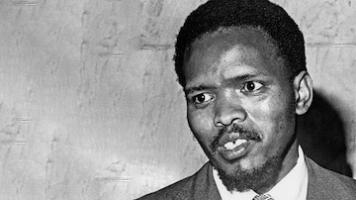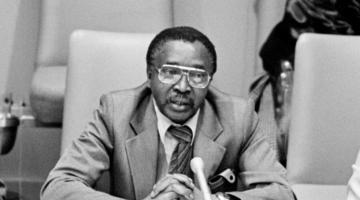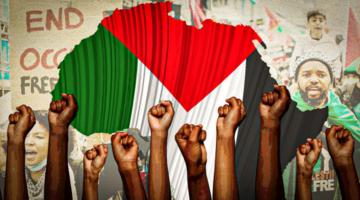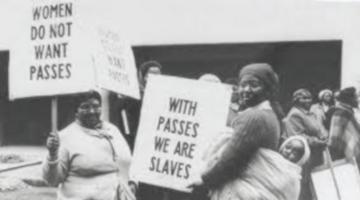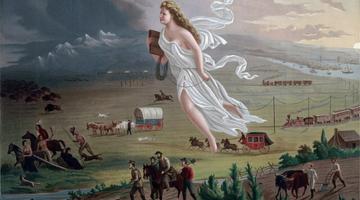Previously in South Africa, millions of people were mobilised in the hope of a better future on May Day. Now, amid mass unemployment and the collapse of an emancipatory vision, that optimism is absent.
Most young people in South Africa do not have a job and are, under current circumstances, unlikely to ever have one. For years, deindustrialisation and the collapse of mining laid waste to unionised jobs. Now state austerity is hacking away at the public sector. Many of the few new jobs that are being created are poorly paid, precarious and not well unionised.
Some of this can be ascribed to powerful global forces that are difficult for any state to resist. And the deep structural features of our society were built by colonialism and are so entrenched that they cannot easily be changed. But there is no doubt that the ANC’s poor economic policy choices have also been a significant part of the failure to build a viable economy. This has been compounded by the appalling state of public education, the collapse of a significant part of the ANC into a violent kleptocracy, the decay of infrastructure and a series of damaging events such as the brutally enforced hard Covid lockdowns, the winter riots and the recent floods in KwaZulu-Natal.
New Frame has previously noted that no highly urbanised society in history has endured the scale of unemployment currently suffered in South Africa, and in particular the scale of youth unemployment, without some sort of social upheaval. The early days of the winter riots, when food was appropriated on a mass scale, showed that previously fragmented expressions of dissent could cohere into a generalised phenomenon. This could happen again, even at a national scale this time, although the character of such an event is undetermined. It is not impossible that it could, for instance, take a xenophobic form.
All kinds of actors, from Julius Malema to Nhlanhla “Lux” Dlamini and Gayton McKenzie, are positioning themselves to rise with the incoming tide. The now ubiquitous experiments in authoritarian populism can veer into fascist territory when hyper-masculinism and militaristic imagery combine with xenophobic scapegoating. Cyril Ramaphosa’s Freedom Day speech – formulaic and insipid – pandered to this with its declaration that “there can be no doubt that we must work urgently to resolve issues of illegal immigration and its impact on our economy and society”.
The president’s positive proposal was a plan to create a “conducive environment for business” and the expectation that, in return, “business should step up their investment in communities and in human capital for the sake of developing South Africa”. A few days before this, we were told that the ANC’s new land reform plan centres around asking farmers to donate land.
‘Civil society’
The lack of any kind of emancipatory vision is now absolute. Ramaphosa may have the independence of mind to aim to take a non-aligned path in international relations, but at home he offers no similar independence of mind and nothing but utter vacuity. The necessity to build a new vision of emancipation, and the social forces to advance it, could hardly be more urgent.
It is imperative that we look beyond the battle in the ANC between a faction led by a man who became very rich through an association with capital and a faction most infamously associated with a man who acquired his wealth via the state. The outcomes in the continuing factional battles in the party are certainly important, but there is no possible outcome in these battles that can restore an emancipatory vision, let alone the potentially emancipatory forms of political organisation to begin to move forward.
In this crisis, much liberal opinion has put its money on “civil society” – a term that most often refers to non-governmental organisations (NGOs) – to be the actor that takes us forward. There are NGOs that do important work, but they are not membership-based organisations and few are able to work with popular organisations in ways that do more good than harm. NGOs are largely managed by well-credentialled professionals and are frequently nodes of intensely racialised power. They are not democratic organisations. Left NGOs have frequently sought to substitute themselves for democratic forms of popular power and have done severe damage to popular organisations, sometimes acting in extraordinarily crude ways.
There are NGOs that work with popular organisations in democratic and enabling ways, but in the main what is termed “civil society” is projects founded by liberal donors, with no credible claim to represent a popular constituency engaged in forms of intra-elite contestation. These modes of contestation often include media campaigns, the courts and lobbying. This is a model that excludes the majority, including the millions of people without work, from being political protagonists.
Popular organising
All the countries that were able, even if for a while, to move out of crisis and towards some sort of social hope in recent years – countries such as Haiti, Brazil, Bolivia and others – did so through the tenacious organisation and mobilisation of the oppressed at significant scale and sustained duration. In many instances, impoverished people in urban shantytowns played a key role along with other actors, including trade unions, rural movements and radical clergy, students, academics and lawyers.
In South Africa today, trade unions remain, outside of the churches, the largest popular organisations. There is no rural organising at significant scale, progressive professionals have mostly succumbed to cynicism or drifted into NGO politics and it’s rare to see a cleric on a picket line or road blockade. When there are moments of rupture with significant scale or intensity, such as the strike at Marikana in 2012, the farm workers’ strike in the Western Cape the following year or the student protests in 2015, they seldom turn into sustained movements. It has only been Abahlali baseMjondolo, which emerged from a road blockade in Durban in 2005, that has been able to build a sustained movement at meaningful scale from one of the many moments of rupture in the ebbs and flows of popular ferment over the past 20 years or so.
Unions are on the back foot, battling constant retrenchments. Many are shrinking and organisations that, as a result of structural forces beyond their control, lurch from crisis to crisis and often defeat to defeat, wracked with lines of fracture and strain. Their leaders are subject to acute stress and are frequently working in a state of permanent exhaustion. When aligned to the ANC, they are often drawn into the toxic politics of the ruling party. But the National Union of Metalworkers of South Africa, which is now organising workers in new sectors including mining, aviation, cleaning and freight, has shown that it is possible for a union to grow on the terrain of endemic crisis by successfully moving into other sectors.
Most South Africans are unorganised. There are whole sectors of work that are unorganised or very weakly organised. But despite the incredibly difficult circumstances of the present it remains possible to organise – on the shop floor and in communities – when there is sufficient commitment to undertake the day-to-day work required to build and connect from below. This is the only way the promise of a better world that once influenced May Day, or Workers’ Day, can be reanimated. It is also the only way to build a Left that can contest the demagoguery and xenophobia festering on the Right.
New Frame is a not-for-profit, social justice media publication based in Johannesburg, South Africa.


